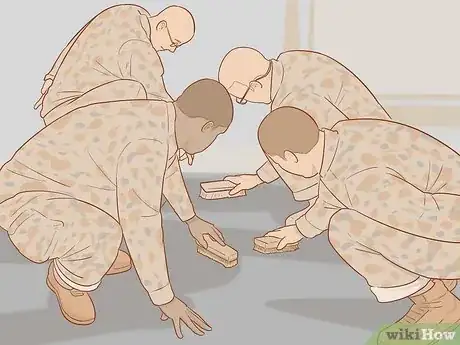This article was co-authored by wikiHow Staff. Our trained team of editors and researchers validate articles for accuracy and comprehensiveness. wikiHow's Content Management Team carefully monitors the work from our editorial staff to ensure that each article is backed by trusted research and meets our high quality standards.
There are 14 references cited in this article, which can be found at the bottom of the page.
wikiHow marks an article as reader-approved once it receives enough positive feedback. In this case, 100% of readers who voted found the article helpful, earning it our reader-approved status.
This article has been viewed 376,232 times.
Learn more...
Serving your country through military service can be very rewarding, educational, and life-changing. To get to there, you have to sign up for and pass boot camp. While no recruit will deny the challenge of getting through boot camp, it still is something you can handle better with some basic studying and training. As you ship out, remind yourself that boot camp is meant to teach you discipline, trust, and self-confidence. Learn these qualities and you can survive boot camp.
Steps
Enlisting in the Military
-
1Schedule an appointment with a military recruiter. While a recruiter’s job is to get you to sign your name on the dotted line, they are also there to help you succeed. You can find a list of recruiters by searching online or visiting the military’s website. Call the recruiter so you have plenty of time to meet them in person. Use this opportunity to clear up any questions you have as you begin the enlistment process.[1]
- Think of your recruiter as a boss interviewing you for a job. You wouldn’t sign up for a job you know nothing about. Similarly, a recruiter wants to see a dedicated applicant who is motivated to learn more about the job.
- Some questions you can ask are “Why should I join,” Are there incentives for joining,” “What is combat training like,” and “What comes after basic training?”
-
2Collect any benefits the government offers new recruits. A few perks may sweeten the looming challenge of boot camp for you. Many recruiters offer you sign-on bonuses or guaranteed promotions. You should settle on this with the recruiter before you sign any papers. Nobody will look down on you for taking a bonus and you will still start with basic training, regardless of your rank.[2]
- Get any potential bonuses written down on paper. They should be in the contract you sign when enlisting. A recruiter’s verbal promise may not be enough to guarantee an incentive.
- If you want to do a specific job in the military, recruiters can help reserve spots in training schools for you.
- If you can’t get a guarantee you want, you don’t have to sign anything right away. Unless you really want to join a specific branch of the military, contact other branches to see what they offer. Otherwise, wait and see if the military can offer a guarantee at a later date.
Advertisement -
3Bring the required identification documents to the recruiter. After you contact the recruiter, they will tell you what documents you need and how to get them. Basically, expect to a personal ID, education records, and legal documents for any marriages or children you have had. The recruiter will use these documents to confirm your identity and register you.[3]
- Proof of citizenship, such as a green card, is needed only if you weren’t born in the country. Otherwise, bring along ID like a driver’s license and your Social Security card if you enlist in the U.S., for example.
- Marriage, divorce, and birth certificates are all required to ensure you don’t have any legal distractions. You will need court documents for issues like paying child support.
- For education records, bring your college transcript, GED, or high school diploma. These are usually required for enlistment.
-
4Tell the truth about any medical and legal issues you have. You may think these will be a problem, and there is a possibility they can keep you out of the military. However, lying will get you in much more trouble. The military will find out eventually, whether through a drug test or a background check. Improve your chances of joining and succeeding by being up front with your recruiter.[4]
- For instance, you should not stop taking medications prescribed by your doctor. These are usually important for your health. When you reach boot camp, the military provides you with any medication you need.
- If a recurring medical issue or mental illness impacts your ability to serve as a soldier, your application may be rejected. Ask your recruiter for a waiver to see if you still qualify for enlistment.
- Legal issues such as criminal convictions aren’t an automatic disqualifier. As long as these issues aren’t outstanding and you show that you’re serious about succeeding in the military, you may get in.
-
5Take the military’s aptitude test. In the U.S., for instance, this test is called the Armed Forces Vocational Aptitude Battery (ASVAB). Militaries across the world use these types of test to help determine what jobs their recruits are best suited for. You take multiple-choice tests covering areas such as math, science, language, and mechanical knowledge. Speak to your recruiter to set up the test.[5]
- You can’t really fail this test, but low scores mean you may be disqualified from the job you want. Always discuss your options with your recruiter.
- You don’t have to rush to take the test, so study for it. If you don’t like your scores, take it again before signing up for boot camp.
-
6Complete a military fitness test. You know boot camp is going to be a challenge to your body, so the fitness test won’t be much of a surprise to you. Most military fitness tests around the world are very simple. It involves doing as many push ups and sit ups as you can in a couple of minutes. Then you try to run a long distance as fast as you can, usually about 1.5 mi (2.4 km).[6]
- Do your best during the test, but don’t fret if you don’t meet the military’s high bar. This is only a preliminary screening. You will get more of a workout in boot camp.
- To improve your chances of passing, get fit before you try to enlist. If you struggle a lot or display health issues, you are less likely to be accepted into the military.
-
7Go to boot camp within a month of completing your tests. Getting sent to boot camp hinges upon you reciting the Oath of Enlistment to your recruiter. If you have been accepted, you will be called into the recruiter’s office at least a week after all the testing, paperwork, and career discussions are complete. After you recite the oath, you are immediately sent to boot camp, so be prepared![7]
- The recruiter and the military will tell you what you need to bring. Usually you need nothing more than a little bit of money, personal identification, and a change of clothing.
- You may also ask for a delayed entry. This means you go to boot camp at a later date, usually within a year.
Training for Boot Camp
-
1Exercise as much as you can to prepare your body. Run long distances, carry heavy equipment, and do push ups, pull ups, sit ups, and crunches. The more physically fit you are before arriving at basic training, the better off you will be. The workload is tough, so you will have a leg up on other recruits if you improve your physical capabilities.[8]
- Arriving at training overweight or lacking strength can make you a target for drill instructors who need to work you into shape.
- In a worst case scenario, if you aren’t able to meet the physical demands of boot camp, you have to go through it a second time or are discharged.
-
2Improve your swimming abilities before going to boot camp. Members of any branch of the military benefit from swimming practice. If you can’t swim by the time you arrive at boot camp, you will have a hard time completing several activities. Practice swimming in a safe period, such as a pool, working on your speed and endurance.[9]
- The military doesn’t have an official swimming test, so you won’t get sent home from boot camp. However, you need to learn before you can complete boot camp. Many recruits learn or get better by participating in the training drills.
- Swimming is especially important in branches like the Navy or Marines, although members of other branches still need to know how to handle water.
-
3Practice basic drill routines used in boot camp. Fitness tests are a part, but not all, of the activities you will go through. You will see plenty of drills during your time at boot camp. Instructors constantly test your ability to act without hesitation. Practice standing upright at attention, pretending that you’re marching and halting as your instructor barks out the commands.
- While at home, fill a laundry basket with clothing, books, notepads, and other items. Dump the basket onto the floor, mix up the items, then quickly sort them on your bed in a neat fashion. This is the kind of test the military expects you to do.
- Also try sitting on the floor with your legs crossed, your back straight, and your hands on your knees. It doesn’t sound difficult, but in boot camp you may be required to sit still for hours at a time.
-
4Get to bed early and wake up early. Rigid scheduling is part of the life of a recruit. In boot camp, expect to go to bed around 9:00 PM and get up around 4:00 AM. This can be very difficult at first, so practice! Adapting to a sleep schedule requires training like any other skill. It’s important to get used to waking early in time for the first day of boot camp.[10]
- Start adjusting your sleep schedule at least 2 weeks in advance. Begin earlier in order to give yourself more time to adjust.
- The first 3 days of boot camp are particularly busy, so you may not get as much sleep as you like. Getting a good night’s rest can help you adjust.
-
5Study jargon and other information relating to military work. Most recruiters can recommend you a few books for study. Learn the basics, such as military rankings, standard equipment, commands used by superior officers, and your branch’s creed or motto. Learning all of this in advance can reduce some of the stress when you’re put on the spot in boot camp.[11]
- You don’t need to know how to fire guns or have other specialized knowledge, although if it is relevant to your work in the military, it can help.
- If you want a specific military duty, studying for it can help you succeed. For instance, if you want to be a mechanic, read up and work on cars.
Succeeding in Boot Camp
-
1Stay quiet and follow orders. Military life is about learning discipline. As soon as you arrive at camp, you are expected to take orders from your drill instructors and commanding officers. Keep your head down, do what they say without complaint, and don’t try to stand out too much. Never argue with your instructors, joke around during drills, or otherwise step out of line.[12]
- Contrary to what you may believe, most drill instructors don’t enjoy tearing you down in front of other recruits. It’s simply their job to be a thorn in your side so that you improve as a recruit.
- A good rule of thumb is to not speak unless spoken to by your superior officers.
-
2Prioritize and focus on any tasks given to you. The military expects you to follow orders, no matter how unrelated they seem to what you signed up for. Sometimes you will be asked to do things you would rather not be doing. Whether you’re marching with your platoon or scrubbing a toilet, do it when asked.[13]
- When you arrive at boot camp, you start receiving orders. You go through processing, which involves things like getting your uniform, setting up your pay, and moving into your room.
- Any recruit would rather be sleeping in or talking with friends rather than fulfilling some of their duties. Remind yourself that there will be plenty of time for this later.
-
3Do what everyone else is doing when you don’t understand commands. There are times when you may not understand the instructions given or may not have been paying attention. Take your cues from other recruits. If you see everyone else moving a certain way, follow their lead. There is a chance you can blend in enough to avoid critique from your drill instructor.
- Unless your instructor is out of earshot, try not to ask other recruits what to do. Many times the instructor will catch you, pull you out of line, and give you an earful.
- If you do get caught doing the wrong thing, don’t grin, but bear the criticism all the same!
-
4Demonstrate leadership qualities by helping other recruits. Drill instructors aren’t looking for people acting like movie stars, but they do notice good recruits. Remember that you are part of a unit, so have your partner’s back. Speak to fellow recruits in your unit and give them gentle reminders about what they’re doing wrong. Set a good example yourself by standing straight with your chin held high, working quickly, and speaking loudly when your drill instructor asks you to.[14]
- While being a leader is important, avoid alienating yourself from fellow recruits. Balance being a leader with being a good friend. Jerks may not get help from fellow recruits.
- Every other recruit will be in a similar position to you. A lot of what you are asked to do will not make sense at first. Boot camp is an opportunity to bond with fellow recruits, relying on each other to succeed.
-
5Cooperate with other people even if you don’t like them. At boot camp, you will encounter all sorts of instructors and recruits. Naturally, not all of them will be your best friend. As a member of the military, you serve in a group, so you quickly learn to get along with anyone. Remind yourself that you’re all in this together.[15]
- Teamwork is essential, so you may notice your group getting punished even if 1 recruit fails. Help those who are struggling. They probably will help you too at some point.
- Avoid letting drill instructors pit you against other recruits. It’s a test. You aren’t at boot camp to achieve individual glory, so don’t make yourself stand out this way.
- If you have a problem with someone, talk to them after lights out.
-
6Avoid making excuses for your mistakes. Drill instructors will call you out even when you aren’t sure you have done anything wrong. Whether your mistake is big or small, look the instructor in the eye and tell them the truth. Say something straightforward, such as “I lack discipline” or “I lack focus.” They may make you do a few push ups, but punishment is often much worse when you don’t take responsibility for your actions.[16]
- For instance, you can’t travel anywhere without permission. Saying “I didn’t know” won’t help you. During deployment, not knowing could get you or someone else injured. When drill instructors asks you what you did, tell them and accept the consequences.
- Some mistakes, such as disobeying your drill instructor, reflect poorly on your unit. Other recruits may be punished with you, which will lose you friends.
-
7Try your hardest to pass difficult physical tests. Many "tests" you go through in basic training are designed to be impossible to pass. When you’re struggling to get over a wall in a 10-part obstacle course, don’t despair. Do your best now and practice later. With time, the task will become easier to you.[17]
- The point of these tests is to break you down, then build you back up with more confidence and discipline than you have ever had before. It is tough work, but it can be rewarding.
- Even if you feel like you can’t succeed, give it your best shot. You don’t need to finish tests in first place to be a good recruit.
Community Q&A
-
QuestionDoes the Air Force basic training focus mainly on being physically fit or will I learn about aerodynamics and such?
 Community AnswerBasic training is mostly about being fit, yes. The AF is the same as the rest of the military. If you want to learn aerodynamics, you will have to be assigned to an AFSC or, AF-job specializing in aircraft, operations, flight, etc.
Community AnswerBasic training is mostly about being fit, yes. The AF is the same as the rest of the military. If you want to learn aerodynamics, you will have to be assigned to an AFSC or, AF-job specializing in aircraft, operations, flight, etc. -
QuestionIs it good to build my body up before going to boot camp?
 Community AnswerAbsolutely! If you begin physical training before you go to boot camp, you will most likely have a head start on the other recruits.
Community AnswerAbsolutely! If you begin physical training before you go to boot camp, you will most likely have a head start on the other recruits. -
QuestionCan I join the military if I have asthma?
 Community AnswerIf you've not had symptoms beyond the age of 13 you can; if you are still suffering from asthma, you cannot.
Community AnswerIf you've not had symptoms beyond the age of 13 you can; if you are still suffering from asthma, you cannot.
Warnings
- Graduating from boot camp often means at least 4 years of mandatory service, so be aware of the service laws in your country.⧼thumbs_response⧽
- The military is not the right option for everyone. Consider you health, your situation, and what you hope to gain by serving.⧼thumbs_response⧽
- From the moment you take the Oath of Enlistment, you are bound by military law. You could be court-martialed and dishonorably discharged for breaking any rules.⧼thumbs_response⧽
References
- ↑ https://www.military.com/join-armed-forces/questions-when-joining-the-military.html
- ↑ https://www.goarmy.com/learn.html
- ↑ https://www.goarmy.com/learn.html
- ↑ https://www.military.com/join-armed-forces/disqualifiers-medical-conditions.html
- ↑ https://www.military.com/join-armed-forces/top-10-things-you-should-know-before-you-join-the-military.html
- ↑ https://apply.army.mod.uk/how-to-join/can-i-join/fitness
- ↑ https://www.todaysmilitary.com/joining/enlisting-in-the-military
- ↑ http://www.stack.com/a/boot-camp-mistakes
- ↑ https://www.military.com/military-fitness/army-basic-training/getting-prepared-for-bootcamp
- ↑ http://articles.chicagotribune.com/2002-11-30/news/0211300118_1_boot-camp-mary-carskadon-sleep
- ↑ http://www.stack.com/a/boot-camp-mistakes
- ↑ https://www.todaysmilitary.com/videos/inside-navy-boot-camp
- ↑ https://www.military.com/join-armed-forces/boot-camp-success-tips.html
- ↑ https://www.military.com/join-armed-forces/boot-camp-survival-tips.html
- ↑ http://www.militaryspot.com/marines/basic-training-marine-corps
- ↑ https://www.military.com/join-armed-forces/boot-camp-survival-tips.html
- ↑ https://www.nationalguard.com/basic-combat-training/basic-training-phases
About This Article
To join the military and survive bootcamp, schedule an appointment with a military recruiter to officially enlist, then take the military's aptitude and fitness tests before heading off to bootcamp. You can prepare for bootcamp by getting plenty of exercise and changing your sleep schedule so you can adjust to going to bed and waking up early. Once you're at bootcamp, try to stay quiet, follow orders, and focus on the tasks you're given. For tips on interacting with drill instructors, read on!




























-Step-10-Version-3.webp)



















































